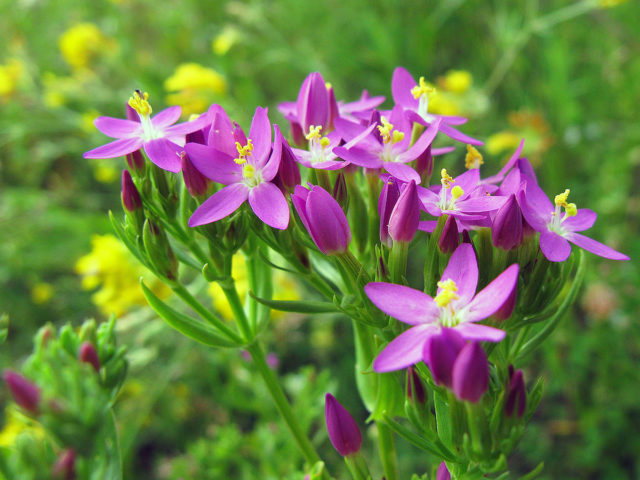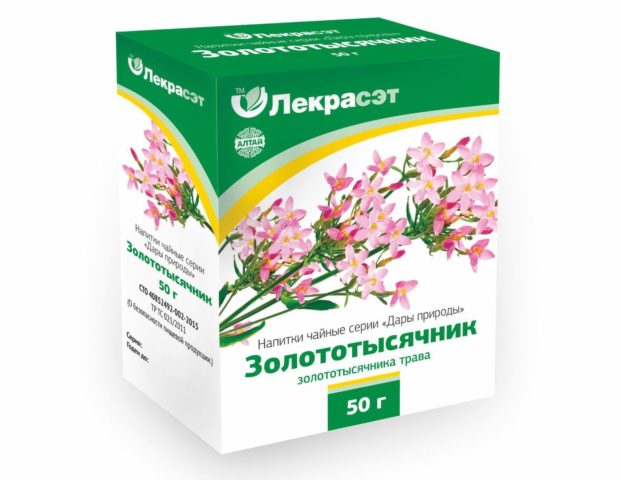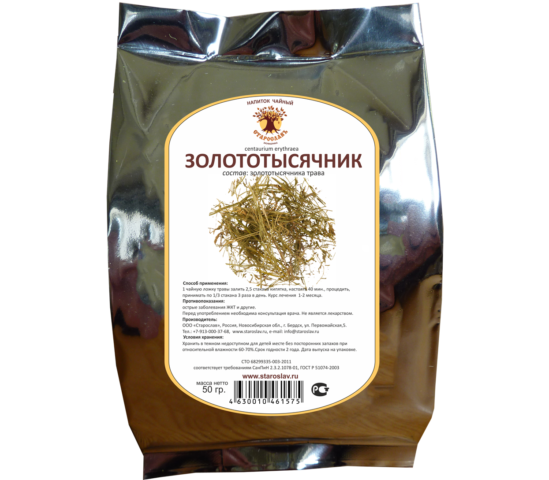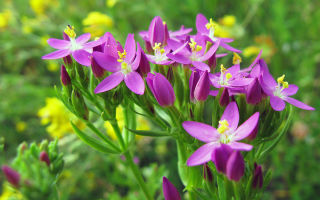Content
The medicinal properties and contraindications to the centaury grass directly depend on its composition. It is a herbaceous plant belonging to the Gentian family. Centaury is ubiquitous in the Mediterranean, European countries, Russia and Ukraine. It is also popularly called the spool and the seven-leaf.
The chemical composition of centaury
In nature, there are about 20 varieties of plants. But in alternative medicine, only the umbrella centaury has become widespread. It is used to normalize the urinary system and improve appetite. The pharmacological value of the plant is due to the content of alkaloids. Thanks to them, centaury has analgesic and sedative effects. The chemical composition of the plant is also represented by the following components:
- chromium salts;
- oleanolic, nicotinic and ascorbic acids;
- bitter glycosides (gentiopicrin, erythrocentaurin and erytaurin);
- essential oils;
- tin;
- vitamins;
- phytosterols;
- wax;
- flavonoids.

Thanks to bitter glycosides, the plant inhibits the activity of worms. In addition, centaury has a laxative effect, which provides a quick cleansing of the intestines from dead parasites. Unlike potent drugs, the plant does not affect the kidneys and liver, and also does not accumulate in the body. Due to this, it rarely provokes side symptoms.
The presence of ascorbic acid in the composition strengthens the immune system, which prevents the development of colds and viral diseases. Phytosterols are involved in strengthening blood vessels and lowering cholesterol. Flavonoids normalize metabolism and protect cells from the harmful effects of the environment.
Where does the centaury plant grow in Russia
Centaury is found in areas with subtropical and temperate climates. On the territory of Russia, it grows in the suburbs of Vologda, St. Petersburg, Ufa and the Caucasus. The largest accumulation of grass is found in arable land and meadows.
Benefits of centaury
In non-traditional medicine, the plant is used for a reason. It is famous for a huge number of medicinal properties. Among them are the following:
- diuretic effects on the body;
- normalization of the outflow of bile;
- desensitizing effect;
- treatment of helminthic invasions;
- decrease in capillary permeability and fragility;
- improved blood composition;
- antipyretic effect;
- antibacterial action;
- decreased stomach acidity;
- improved appetite;
- antiviral effect;
- relief of inflammatory processes.
Centaury is used for medicinal and prophylactic purposes. The plant can be combined with other herbs as needed. To achieve a specific goal, a fairly long treatment may be required.The scheme for taking medicinal herbs in each case will be different.
Long-term studies have shown that centaury stimulates uterine contractility and improves intestinal peristalsis. It helps with digestive diseases and some pathologies of the female reproductive system.
The healing properties of centaury can help get rid of alcoholism. It cleanses the body of toxins and reduces cravings for alcohol. Together with this, the plant has a tonic effect.
Centaury's harm
When used in large dosages, the medicinal properties of the plant are neutralized. In this case, centaury can harm health. It is especially dangerous to take it together with alcoholic beverages. Possible side effects of the plant include:
- an allergic reaction;
- abdominal pain;
- stool disturbance;
- increased sweating.
Contraindications to centaury
Not everyone knows that herbal medicine is not as harmless as it might seem at first glance. Therefore, before carrying out it, it is advisable to consult a doctor. He will tell you in which cases it is not recommended to practice plant treatment. Contraindications for centaury are as follows:
- age under 12;
- liver and kidney disease;
- stomach ulcer;
- allergy to centaury;
- pregnancy and lactation.

Taking medicinal herbs for peptic ulcer disease can provoke a deterioration in well-being. The most common side effect in this case is severe abdominal pain and nausea. During pregnancy, the herb can change hormonal levels and provoke uterine contractions, leading to miscarriage.
How to take centaury
In pharmacies, the herb is found in the form of dried raw materials and alcohol tincture. If necessary, the basis for the preparation of medicinal products can be made independently.
To prepare the infusion 2 tbsp. l. dried centaury is poured with hot water. The drink is kept under the lid for at least 15 minutes. It is taken 50 ml up to 3 times a day. The broth is prepared in the same proportions. It needs to be boiled for half an hour. Take 3 times a day for 1 tbsp. l.
Alcohol tincture can be prepared at home or bought ready-made at the pharmacy. It is customary to take it in 20-30 drops, half an hour before meals. The number of tricks depends on the purpose of the application. The total duration of the treatment course should be at least 10 days.
Application of the herb centaury
Centaury has a fairly wide range of applications. The most widespread is the terrestrial part of the plant. It is often used to treat diseases of the digestive system. Sometimes centaury is also used as an additional therapy in the treatment of serious pathologies. There are the following forms of remedy:
- oil extract;
- alcohol tincture;
- broth;
- the juice;
- tea;
- infusion.
In traditional medicine
Despite the plant origin, centaury is in demand in traditional medicine as well. It can be found in medicines. The herb is one of the active components of Canephron N tablets, which have a diuretic and antispasmodic effect. They are prescribed for chronic kidney disease and inflammatory processes in the bladder. The drug is taken 2 tablets up to 2 times a day.
In folk medicine
Centaury is often found in choleretic herbal preparations. Its effect is enhanced with the help of calamus root and sandy cmin flowers. A decoction based on these components is drunk in 1 tbsp. on empty stomach.
Centaury with colitis is taken together with chamomile and valerian root. To prepare a decoction, 6 g of dry mixture is poured into 1.5 tbsp. hot water. Then the drink is boiled for 30 minutes. To achieve the desired effect, you need to take a decoction of 50 ml 4 times a day.
To get rid of worms, use alcohol tincture. It is prepared in a ratio of 1 tbsp. l. raw materials for ½ st. alcohol. The drink is aged for 2 weeks. For long-term use, you should prepare a large amount of funds. Reception is carried out 30 minutes before meals, 15 drops.

In the chronic form of hepatitis, a centaury infusion is prescribed. It is taken in 1/3 tbsp. an hour before meals. A similar treatment regimen is suitable for diabetes mellitus and cholecystitis. The effectiveness of the medicinal herb is also noted in relation to the following diseases:
- cardiovascular pathology;
- gastritis;
- diseases of the ENT organs;
- skin ailments;
- chronic alcoholism;
- inflammatory processes in the oral cavity;
- postoperative period.
Centaury during pregnancy
During the carrying of a child, the use of any medicines is questioned. Herbs are no exception. It is better to check the possibility of their use on an individual basis. Centaury is dangerous in that it is able to provoke intense contractions of the uterus. This is fraught with miscarriage.
Storage and collection
A characteristic feature of the herb is the absorption of toxic substances from the environment. Therefore, you need to be as responsible as possible when choosing a place for collecting raw materials.
Experts advise to collect the medicinal plant high in the mountains. A forest edge or a flower field is also suitable for these purposes. It is important that the site is away from industrial facilities.
The collection of the plant is carried out on a sunny warm day. It is advisable to use a knife or sharp scissors. In wet weather, picking grass is strictly prohibited. The optimal period is from June to September. When choosing, one should give preference to specimens with stems without damage and blossoming flowers. You need to fold the assembled centaury in a cardboard box or plastic bag.
In order to prolong the beneficial properties for a long time, the plant is dried. Before that, it is sorted out for spoiled stems and leaves. It is also necessary to rinse the plant with running water. The prepared centaury is divided into small bouquets and carefully tied. Suspended in a warm but ventilated room. A balcony or an attic is most suitable.
You can also dry on a flat surface. To do this, use scissors to separate the inflorescences from the plant. The drying process takes several hours. To avoid mold, the raw materials are stirred periodically. In the oven, drying is carried out at a temperature of 40 ° C. If the indicator is higher, the phytoncides that make up the plant will evaporate. The full readiness of the centaury is evidenced by the dark green color with a grayish tint.
Dried centaury should be stored in the attic, closet or closet. Storage requires a glass container with a sealed lid. Paper bags can also be an alternative. During storage, exposure to moisture and high temperatures should be avoided. Subject to all conditions, the herb will retain its beneficial properties for a year.
Conclusion
The medicinal properties and contraindications to the centaury herb cause a lot of controversy, since in some cases it is contraindicated for use. The correct approach to treatment protects against possible side symptoms. Therefore, it is important to follow the doctor's recommendations and rule out the presence of allergies.

